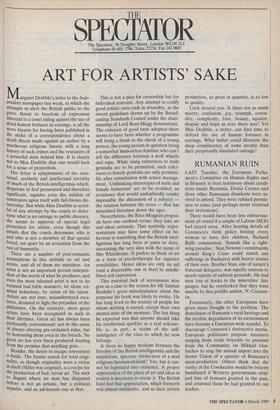SPECTAT T OR
The Spectator, 56 Doughty Street, London WC1N 2LL Telephone 01-405 1706; Telex 27124; Fax 242 0603
ART FOR ARTISTS' SAKE
Margaret Drabble's letter to the inde- pendent newspaper last week, in which she attempts to alert the British public to the grave threat to freedom of expression inherent in a court ruling against the use of dried human foetuses in earrings, is all the more bizarre for having been published in the midst of a correspondence about a death threat made against an author by a murderous religious fanatic with a long history of such crimes and the resources of a powerful state behind him. It is clearly not to Miss Drabble that one would look for a sense of proportion. Her letter is symptomatic of the emo- tional, aesthetic and intellectual triviality of much of the British intelligentsia which, desperate to feel persecuted and therefore significant, equates even the mildest of constraints upon itself with full-blown dic- tatorship. But while Miss Drabble is scorn- ful of any attempt by the courts to deter- mine what is an outrage to public decency, she seems to approve of. special legal protection for artists, even though this entails that the courts determine who is and who is not a member of that special breed, set apart by an avocation from the rest of humanity. There are a number of post-romantic assumptions in this attitude to art and artists, and all of them are mistaken. An artist is not an important person indepen- dent of the worth of what he produces; and even the most talented artist is not to be excused bad table manners, let alone cri- minal behaviour, by virtue of his talent. Artists are not lone, misunderstood crea- tures, destined to fight the prejudice of the Philistines. On the contrary, most great artists have been recognised as such in their lifetimes. Great art has always been profoundly conventional: not in the sense of always obeying pre-ordained rules, but by honouring them even in the breach. No great art has ever been produced starting from the premise that anything goes. Besides, the desire to escape convention is futile. The frantic search for total origi- nality, as though originality were a virtue in itself (Hitler was original), is a recipe for the production of bad, trivial art. The wish to disgust where no man has disgusted before is not an artistic, but a political impulse, and an adolescent one at that. This is not a plea for censorship but for individual restraint. Any attempt to codify good artistic taste ends in absurdity, as the recent guidelines drawn up by the Broad- casting Standards Council under the chair- manship of Lord Rees-Mogg demonstrate. The criterion of good taste adopted there seems to have been whether a programme will bring a blush to the cheek of a young person, the young person in question being a somewhat humourless feminist who can't tell the difference between a wolf whistle and rape. While slang references to male genitalia are to be permitted, such refer- ences to female genitalia are only permissi- ble after consultation with senior manage- ment. 'Unthinking stereotypes of male and female behaviour' are to be avoided; an avoidance that would undoubtedly render impossible the discussion of a subject the relation between the sexes — that has nourished literature down the ages.
Nevertheless, the Rees-Moggian propos- als have one cardinal virtue: they take art and ideas seriously. That symbolic repre- sentations may have some effect on be- haviour is something that the British intel- ligentsia has long been at pains to deny, associating the very idea with the name of Mrs Whitehouse. It prefers to think of art as a form of psychotherapy for superior sensibilities. Hence ideas are only an aid (and a dispensible one at that) to uninhi- bited self-expression.
This essential lack of seriousness may give us a clue to the reason for Mr Salman Rushdie's gross miscalculation about the response his book was likely to evoke. He has long lived in the society of people for whom nothing is sacred, except their own mental state of the moment. The last thing he expected was that anyone should take his intellectual sparkler as a real volcano. He is, in part, a victim of the self- indulgence of the class to which he now belongs.
Is there no happy medium between the frivolity of the British intelligentsia and the murderous, ignorant intolerance of a mad religious fundamentalism? Yes; but it can- not be legislated into existence. A proper appreciation of the place of art and ideas in society is necessary to create it. The British have lost that appreciation, which formerly was almost instinctive, and so their artistic production, so great in quantity, is so low in quality.
Look around you. Is there not as much misery, confusion, joy, triumph, cowar- dice, complexity, love, beauty, squalor, despair and hope as ever there was? Yet Miss Drabble, a writer, can find time to defend the use of human foetuses in earrings. What better could illustrate the deep complacency of some people than their perpetually simulated outrage?
















































 Previous page
Previous page